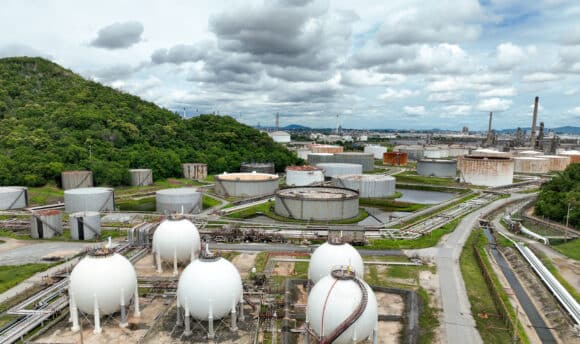Facing billions in climate-related losses, companies are losing more profits from climate change than gained in fossil fuel premiums
Hartford – Today, the Insure Our Future campaign released its eighth annual scorecard report Within Our Power. The report reveals that climate change accounts for an estimated $600 billion, or over a third, of global insured weather losses over the last two decades – an immense climate price tag that insurers have long been passing on to policyholders.
Connecticut is known as the “Insurance Capital of the World.” The state’s economy is heavily reliant on the industry, including companies like Travelers, The Hartford and W R. Berkley. This report brings to light the industry’s severe financial negligence, while trying to pass the cost onto the state’s residents.
How did Connecticut insurers rank?
For more than half the companies analyzed, including Travelers, estimated climate-related losses exceeded their coal, oil, and gas premiums in 2023. Insure Our Future estimates that $540 million of Travelers insured weather losses may be climate attributable according to their market share, significantly exceeding the $475 they are estimated to have underwritten for commercial fossil fuel clients in 2023.
With the fossil fuel premiums representing only 1.16% of the company’s total premiums (commercial and personal lines), this raises serious questions why Travelers is exacerbating climate risks to nearly 99% of its business by supporting continued fossil fuel expansion.
W.R. Berkley was ranked as one of five companies with the worst score. Through over 50 Freedom of Information Act requests the report revealed that W.R.Berkley insures two high risk liquefied natural gas (LNG) terminals; Freeport LNG in Texas, and Cameron LNG in Louisiana. Freeport is a facility with a history of fires, safety incidents, regulatory violations, and experienced a major explosion in 2022. Cameron LNG is a facility with over 60 documented releases of hazardous air pollutants including cancer-causing benzene.
The Hartford is another listed insurer of the Cameron LNG terminal. This is especially frustrating for advocates, as they bill themselves as “one of the most ethical companies in the world.” In April 2022, the company committed to being net zero, but we have yet to see any progress on that front.
“Insuring these terminals are the furthest thing from ethical. Frontline communities, particularly Black and Brown communities, are experiencing disproportionate pollution impacts from the terminals that Connecticut companies underwrite. They are also being hit with rapidly increasing insurance rates and decreasing availability of coverage. Companies like The Hartford should know better than to insure these harmful projects”
What are the direct impacts of Connecticut insurers policies?
Over the last five years, climate activists have set their sights on property and casualty insurers in the state, advocating for companies to drop the underwriting and investments on fossil fuels. This year the fight gained new urgency, as it marked the first year to cross the red line of 1.5°C global heating.
Earlier this year Roishetta Sibley Ozane, activist and founder of the Vessel Project of Louisiana, traveled to The Hartford in Connecticut, asking for a meeting with executives to discuss the harm the Cameron LNG project has brought to her community. However the company refused to meet with her.
Despite the fact that communities within three miles of proposed terminals are exposed to more dangerous particulate matter than 80% of U.S. residents, their rights to consultation and consent are routinely ignored.
“Connecticut Third Act implores insurance companies to insure a livable planetary future of our children and grandchildren. They can do this by divesting from fossil fuel projects, which create climate chaos, and investing in renewables."
What can Connecticut do?
In October of this year, the Connecticut Insurance Commissioner announced the formation of the Extreme Weather Mitigation & Resiliency Advisory Council, that will explore the development of a mitigation and resiliency program for Connecticut.
“We are encouraged by some of the actions taken by the Connecticut Insurance Department. However the council is made up of industry lobbyists and executives, including two VPs from The Hartford and Travelers. This indicates that the industry is working to pass the cost of climate change onto taxpayers and avoid accountability for their own climate-exacerbating policies. Connecticut taxpayers should not have to foot the bill for the damages these companies have created, while they are continuing to profit off of fossil fuel projects.”
With voluntary corporate actions falling far short as irreversible tipping points loom, lawmakers and regulators must act decisively. You can read the Insure Our Future’s key recommendations, and the full U.S. press release here.
This past legislative session, climate activists made a push for a “polluters pay” bill, where a surcharge would be placed on insurer’s fossil fuel policies in the state. This surcharge would fund climate resiliency in climate-affected communities in CT. This provision was attached to SB11 The Governor’s Climate Resiliency Bill.The bill passed out of committee, but was never brought to a vote in either chamber. Climate activists have committed to working on a similar policy this upcoming 2025 legislative session.
“The evidence is undeniable — climate change represents an existential risk for the insurance industry,” write former California insurance commissioner Dave Jones and senior actuary Dr Louise Pryor in a joint foreword for the report. “The insurance industry has historically helped make societies more resilient. Now it must embrace its power and accelerate the transition to clean energy, stop underwriting new fossil fuel projects, and rapidly align with credible 1.5°C transition pathways.”
With solar and wind energy already cheaper than fossil fuel alternatives, insurers must urgently redirect their focus from risky fossil fuel projects, like LNG expansion, to accelerating the clean energy buildout. This transition would be able to provide over a third of needed emissions reductions by 2030 for a 1.5°C pathway.
###
Connecticut Citizen Action Group is a partner in the international Insure Our Future campaign, which works to document insurance involvement in the climate crisis and pressure the industry to stop insuring and investing in fossil fuels, support the clean energy transition, and to protect the most directly affected communities.



